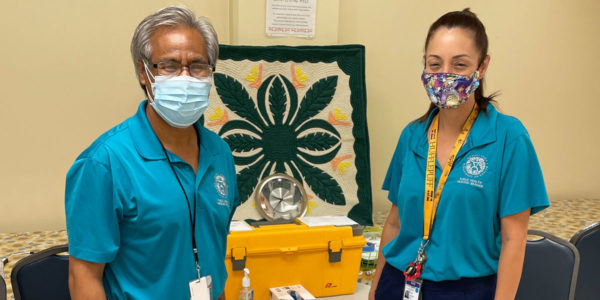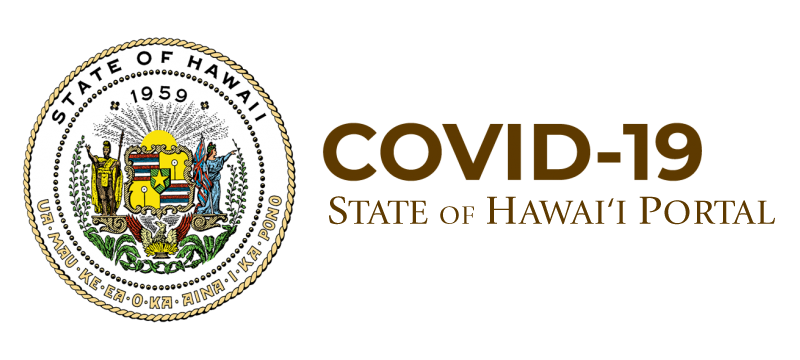Many of the preventative measures that protected us during the COVID-19 pandemic also prevent the spread of other diseases, including monkeypox. Preventative measures include staying home when sick, washing hands, limiting close personal contact with people who have symptoms, and getting vaccinated.
While COVID-19 vaccines are recommended for everyone age six months and older, the JYNNEOS vaccine that protects against monkeypox is currently only for certain populations.
- What is monkeypox?
- Monkeypox is generally rare, less severe, and much less infectious than smallpox. However, it can be a serious illness. It can be spread from infected humans, animals, and materials contaminated with the virus.
- Who’s eligible for the vaccine?
-

Leeward O‘ahu Public Health Nursing provides the JYNNEOS vaccine at the Waipahu Civic Center.
The JYNNEOS vaccine is available statewide to Hawaiʻi residents who:
- Had close contact in the last 14 days with a person with known or suspected monkeypox infection.
- Are gay, bisexual, and other men who have sex with men (MSM) and transgender individuals who have multiple or casual sex partners (e.g., such as through dating apps).
-
- Should I be worried about getting monkeypox?
- The risk to most Hawai‘i residents remains low. Though infectious diseases rarely stay in one group of persons, in the current phase of the outbreak both nationally and in Hawai‘i, the monkeypox virus is primarily spreading among social networks of gay, bisexual, and other men who have sex with men.
- How does monkeypox spread?
- Monkeypox does not spread as easily as COVID-19. COVID-19 moves from person to person in small airborne droplets or aerosols. Monkeypox is mainly spread through prolonged close or direct contact with body fluids, lesion material, or items used by someone with monkeypox. Monkeypox may be spread through large respiratory droplets. These droplets generally cannot travel more than a few feet, so prolonged (>3 hours) close contact is required.
- What are the symptoms?
- Infection often begins with flu-like symptoms such as fever, headache, muscle aches, chills, exhaustion, and swollen lymph nodes. Infection progresses to a rash or sores, often on the hands, feet, chest, face, or genitals. People generally become ill within 21 days of exposure. People may have all of the symptoms or only a few.
- When is someone infectious?
- A person with monkeypox is infectious from the time symptoms start to when the rash has fully healed and a new layer of skin has formed. Monkeypox typically lasts 2-4 weeks. People who do not have monkeypox symptoms cannot spread the virus to others.
- Can monkeypox be treated?
- Antivirals, such as tecovirimat (TPOXX), may be recommended for some individuals diagnosed with monkeypox. This must be coordinated through DOH and a medical provider.
“With continued cases of monkeypox infections in Hawai’i and nationally, it is important for those eligible to get vaccinated,” said Deputy State Epidemiologist Dr. Nathan Tan. “The Hawaiʻi Department of Health and healthcare providers in each county are working together to vaccinate eligible individuals.”
“We are grateful to collaborate with the Hawai’i State Department of Health by providing monkeypox vaccinations to our community,” said Heather Lusk, Executive Director of the Hawai’i Health & Harm Reduction Center. “We are lucky to have access to this prevention tool and want to make sure people who may be at risk get immunized.”
If you’re eligible and interested in the JYNNEOS vaccine, find your nearest monkeypox vaccination clinic and schedule an appointment. If you think you have monkeypox or have been in close contact with someone who has monkeypox, contact your healthcare provider.
Denby Fawcett: Why So Few People Are Getting The New Covid Shot
Experts are worried about the lack of interest as people are still suffering from the virus and long Covid. By Denby Fawcett Original article on Civil Beat, November 7, 2023 I keep a card in my [...]
Federal Public Health Emergency (PHE) for COVID-19 ends on May 11, 2023
HONOLULU, HI –The federal Public Health Emergency (PHE) for COVID-19, declared under Section 319 of the Public Health Service Act, will expire at the end of the day on May 11, 2023. As the PHE [...]
Seniors now eligible for additional COVID-19 bivalent booster dose, COVID vaccine recommendations simplified
HONOLULU, HI – The Hawai‘i Department of Health (DOH) supports the latest recommendations announced yesterday by the Centers for Disease Control and Prevention (CDC), allowing an additional dose of the bivalent booster against the virus [...]
Hawai‘i COVID-19 hospitalizations on the rise
HONOLULU, HI – The Hawai‘i Department of Health (DOH) reports a rise in the rate of COVID-19 hospitalizations. The number of total positive COVID-19 hospitalizations has increased over the past week (3/26 – 4/4) from [...]
Wastewater Samples Show Higher COVID Concentrations & New Subvariant
The Hawai‘i State Department of Health’s most recent Wastewater Surveillance Report documents two significant developments about COVID-19 in Hawai‛i. Higher concentrations of the virus that causes COVID-19 The arrival of the XBB.1.5 subvariant Higher concentrations [...]
Bivalent boosters for keiki as young as 6 months
Updated COVID-19 bivalent boosters are now available in all counties for keiki as young as six months of age. The U.S. Food and Drug Administration (FDA) amended the emergency use authorization for the bivalent boosters [...]
